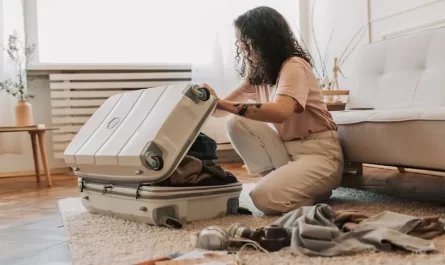We’ve all been there, excitedly jetting off to our next adventure or important meeting, only to find out our checked-in luggage decided to take a detour. Don’t worry, I’m here to guide you through this little hiccup in your journey, so you can get back to enjoying your trip or nailing that business deal!
Contents
- 1 What to do if your luggage is lost by airline?
- 2 What are the rules if an airline loses your luggage?
- 3 Compensation for Delayed Bags
- 4 What is the maximum liability for lost luggage?
- 5 Do airlines compensate for lost luggage?
- 6 Report Your Lost Luggage Immediately
- 7 Fill Out a Property Irregularity Report (PIR)
- 8 Request delivery to your home or hotel
- 9 Checked Baggage Fee Reimbursement
- 10 Check your credit card benefits
That unpleasant twist in your gut when your suitcase is nowhere to be found at baggage claim is definitely not the ideal way to wrap up your flight. But don’t worry, if your luggage goes missing, there are clear actions you can take to either retrieve your bag or get compensated for your loss. Airlines, along with any travel insurance you might have, are generally prepared to cover your daily essentials and even the replacement cost of your belongings. However, it’s crucial to act quickly.
We often don’t anticipate our luggage getting lost, but even with the best travel plans, things can sometimes go off track. If your bag is delayed or lost by an airline, here are some simple steps to follow. Remember, at large airports, baggage procedures can be intricate, and it’s not unusual to wait 30 to 45 minutes for your bags. Your luggage might arrive in separate batches from the same flight, so don’t panic if your suitcase doesn’t show up right away. A little patience can be very helpful.
If your bag doesn’t appear on its assigned carousel, it might still be on the flight but offloaded at a different spot. It’s a good idea to check other carousels, as your bag might have ended up there by mistake. Your luggage could also be in the airline’s baggage office or another designated area.
Ideally, these mix-ups shouldn’t occur, but it’s always wise to double-check these possibilities before declaring your bag missing to the airline.
What to do if your luggage is lost by airline?
When an airline confirms that your bag is officially lost, they’re on the hook to compensate you for the contents of your bag. However, keep in mind that they’ll factor in depreciation and there are upper limits to how much they’ll pay out. So, while you’ll get some compensation, it might not cover the full current value of everything that was in your bag.
What are the rules if an airline loses your luggage?
Ah, the pesky scenario of an airline losing your luggage – not the kind of travel souvenir anyone wants! But fear not, there are specific rules in place to protect you and help resolve the situation. Let’s break them down:
Reporting Lost Luggage: If your bags don’t show up on the carousel, report it to the airline right away. This is usually done at the airline’s baggage claim office. It’s important to do this before you leave the airport.
Filling Out a Property Irregularity Report (PIR): The airline will have you fill out a PIR. This form is your official lost luggage claim, and it’s essential for tracking your bag and any compensation claims.
Tracking and Recovery Efforts: Airlines typically have systems to track and locate lost luggage. They’ll use the details you provide (like the bag’s appearance and contents) to find it. Keep the reference number from your PIR handy for updates.
Compensation for Delayed Bags
:
If your bags are just delayed, airlines usually offer compensation for essentials like toiletries and basic clothing. This varies by airline, so ask about their specific policy.
What is the maximum liability for lost luggage?
In the world of air travel, the headache of lost luggage is somewhat eased by compensation rules, which vary across different regions. Let’s take a look at the maximum liability for lost luggage in the USA, Europe, and other countries.
In the United States, for domestic flights, the Department of Transportation sets a maximum liability limit. This amount is periodically adjusted for inflation and is usually higher than the per-kilogram rate. For international flights, the Montreal Convention comes into play, standardizing liability limits globally. Airlines are liable for a certain amount per kilogram of checked luggage or a flat maximum amount, whichever is lower.
Europe follows similar rules under the Montreal Convention for international flights. However, European airlines might offer additional compensation through their policies or EU regulations, especially for flights within the European Union.
Other countries also adhere to the Montreal Convention for international travel, providing a standard level of compensation. However, for domestic flights, each country has its own regulations and limits, which can be significantly different from the international standards.
In all cases, it’s crucial to remember that these amounts represent maximum limits. Actual compensation might be lower, depending on the depreciated value of your belongings and the airline’s specific policies. Always check with your airline for the most accurate and current compensation information.
Depreciation and Actual Value:
Airlines consider the depreciated value of your items, not necessarily the replacement cost or original purchase price. This means you might not get the full amount to replace everything new.
Time Frame for Compensation Claims: There’s typically a deadline for filing compensation claims (could be as short as 21 days from when the luggage was supposed to arrive), so don’t delay in submitting your claim.
Documentation and Receipts: Keep all your receipts for any emergency purchases and a record of all communications with the airline. These will be important for your compensation claim.
Travel Insurance: If you have travel insurance, check your policy. It might offer additional coverage for lost luggage.
Lost and Found: If the airline finds your luggage after you’ve been compensated, they usually contact you. You might have the option to get your bag back or leave it if you’ve already been compensated.
Remember, the rules can vary slightly between airlines and countries, but these general guidelines are a good starting point. Always check the specific airline’s policy for the most accurate information. Safe travels and fingers crossed that your luggage always arrives with you! ✈️🧳🌍
Do airlines compensate for lost luggage?
Absolutely, airlines do compensate for lost luggage! When your checked bag is officially declared lost, which usually happens after a period (often 21 days), the airline is responsible for reimbursing you. However, this compensation is subject to certain limits set by international and domestic regulations, like the Montreal Convention for international flights. They consider the depreciated value of your items and there’s a cap on the maximum amount. Also, if your bag is just delayed, you might get some money for immediate essentials. Always keep your receipts and file a claim within the airline’s deadline! ✈️🧳💼
Let’s dive into the key steps you should follow if your luggage gets lost.
Report Your Lost Luggage Immediately
First things first, head straight to the airline’s baggage service office at the airport – and this should be done before you even think about leaving the airport. This is usually located near the baggage claim area. Inform them about your missing luggage and provide them with all the necessary details: your flight information, baggage claim ticket, a description of your luggage, and your contact information. This step is crucial because airlines usually have a limited time frame for you to report lost luggage.
Your best bet for quick action is to talk to someone at the baggage claim or check-in desk. If you can’t locate an airline representative there, then give the airline a call. Make sure to fill out any necessary forms for your lost luggage claim while you’re still at the airport.
The airline will usually give you a toll-free number for updates on your claim. It’s also a good idea to check out the airline’s website, specifically their lost luggage policy page. This gives you a written reference, which is helpful because, let’s face it, losing your luggage can be overwhelming, and it’s easy to forget verbal instructions from the desk agent in all the stress.
Fill Out a Property Irregularity Report (PIR)
The airline will ask you to fill out a PIR. This document is super important as it officially logs your lost baggage complaint. Make sure you get a copy of this report, as it contains a reference number you’ll need to track the status of your luggage and for any future compensation claims.
Request delivery to your home or hotel
Ensure that the airline has your contact details so they can reach out to you with any updates. Typically, most airlines will bring your luggage directly to your home or hotel once they’ve located it.
If the airline representative doesn’t bring up this delivery service, make sure to inquire about it before you exit the airport. Having your luggage delivered can spare you a return journey to the airport to retrieve it. This is particularly convenient if you’re on a tight schedule, such as during a business trip, where every minute counts.
Keep Track of Your Bag’s Status
Most airlines have an online tracking system where you can check the status of your lost luggage using the reference number from your PIR. Keep an eye on this, as it’s the fastest way to get updates.
Checked Baggage Fee Reimbursement
If you find yourself away from home and your missing luggage contained essentials like medications, chargers, or a change of clothes, it’s important to ask the airline about the immediate support they can offer. Many airlines provide an emergency stipend for such essential purchases, so don’t hesitate to ask about this provision.
Additionally, some airlines may refund your checked baggage fees if your luggage is delayed for at least 12 hours after you’ve filed the claim. This is why acting swiftly is crucial – the sooner you notify the airline, the quicker the reimbursement process can start.
When you’re submitting claims for any incidental expenses, like clothing and toiletries, the airline might also handle the request for checked baggage fee reimbursement. This is typically done in the same process, streamlining your claims for convenience.
Keep Your Receipts
Many airlines offer a reimbursement of up to $50 per day for up to five days to cover reasonable incidental expenses caused by lost or delayed baggage. These expenses often include items such as clothing, toiletries, and a cell phone charger. It’s a good idea to ask the airline for clarification on what they consider a “reasonable purchase.”
As a rule, try to replace items similar to what you normally use, as this increases the likelihood of your compensation claim being accepted. Remember, it’s essential to keep all your receipts for these purchases. These receipts are crucial for you to be able to claim reimbursement from the airline. So, if you find yourself having to buy essentials, make sure to keep those receipts in a safe place for future reference.
Check your credit card benefits
Your credit card, used to book the flight, could be a hidden gem in this situation, as it might offer benefits for lost or delayed baggage. These perks could kick in earlier than the airline’s policies and cover expenses not already reimbursed by the airline or any travel insurance you have.
It’s important to familiarize yourself with your credit card’s benefits guide to understand any deadlines for notification. Typically, you may need to inform your credit card company within a 20-day window to initiate the claims process.
In the event of lost luggage, be ready to provide a ‘Proof of Loss’ statement issued by the airline. Additionally, keep all purchase receipts for the items that were lost or damaged, as these are necessary to file for compensation through your credit card’s benefits.
Follow Up
If your luggage isn’t found within a day or two, it’s time to follow up with the airline. Use the contact information provided on your PIR and keep the communication lines open.
Claim Compensation
If your luggage is declared officially lost (usually after 21 days), you can file a claim for compensation. This is where your PIR and any receipts for essential purchases come in handy. The compensation amount can vary, so check the airline’s policy and the Montreal Convention regulations if applicable.
Review Your Travel Insurance
If you have travel insurance, give them a call too. They often cover lost luggage and might offer a higher compensation than the airline.
Stay Positive and Enjoy Your Trip
While it’s a bummer to lose your luggage, try not to let it ruin your trip. Explore, enjoy, and remember that this is just a small part of a bigger adventure.
And remember, we’re here to keep you informed and ready for any travel twists and turns. So, buckle up, enjoy your flight, and let’s hope your luggage loves traveling with you as much as you do! Safe travels, everyone! 🌍✈️🧳
Lost, Delayed, or Damaged Baggage
Baggage RulesAll about Carry-On Luggage and Travel
Checked Bag: Costs, Tips, and Tricks
Airlines with free baggage
Flying with a smart suitcase
Flying with Oversize and Overweight Bags
How can I make my luggage weigh less?
Checked Luggage Restrictions
Can I take a Cricket Bat on an airplane?
Are expensive travel bags worth it?
Can I have a carryon and a backpack and a purse?
Going through airport security with food
Advantages of Traveling Light with Only Carry-On
Plug Adapter or Voltage Converter
Hard or Soft Luggage?
Can I Trust My Bathroom Scale for Weighing Luggage
What happens if your checked luggage gets lost?
Why are lithium batteries dangerous on planes?
To pack or not to pack? Lithium ion batteries on planes
Hacks To Beat Baggage Fees





